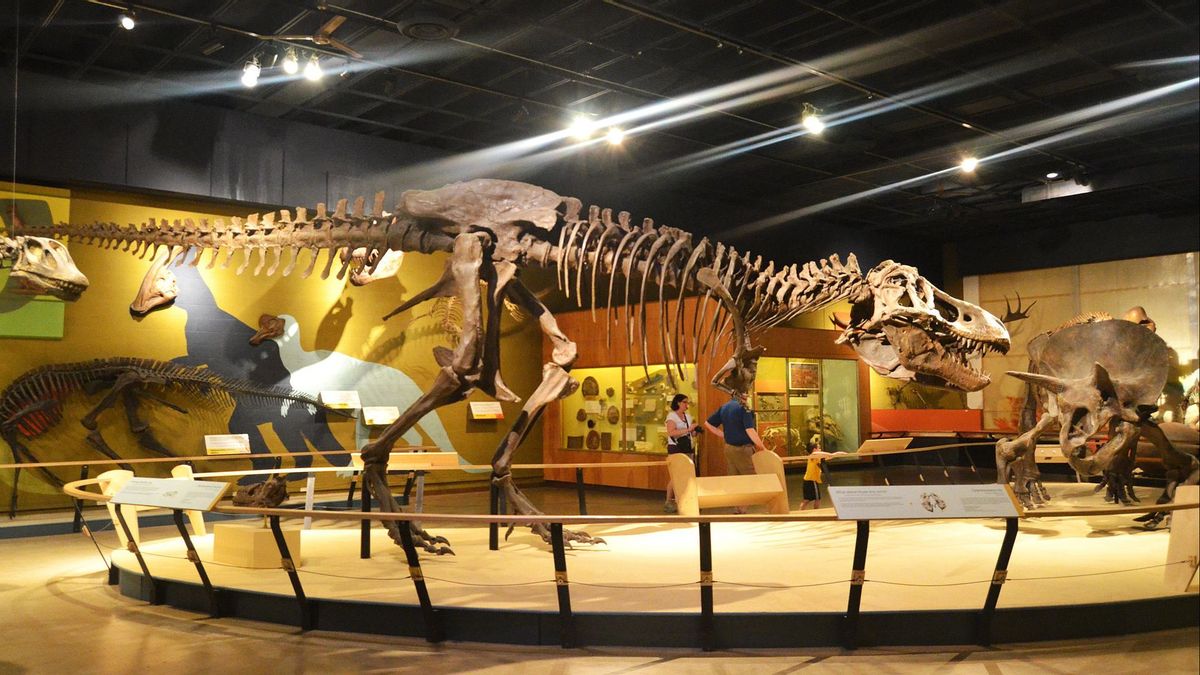JAKARTA - About 67 million years ago, two iconic dinosaurs, Triceratops horridus and Tyrannosaurus rex died and were quickly buried together in one grave. Both of them endured battle wounds, and this was the kind of battle that scientists had speculated for years.
This impressive complete fossil from the 'Duel Dinosaurs' will be exhibited and studied at the North Carolina Museum of Natural Sciences (NCMNS) in 2022. The museum is located in the center of Raleigh City. But there is another story related to how these fossils can be in the museum.
Quoting National Geographic, Wednesday, November 18, commercial fossil hunter Clayton Phipps and his colleagues found the skeleton in 2006 on a private farm in Montana. He did the excavation himself with the aim of selling fossils in the future. Years earlier, the Tyrannosaurus rex nicknamed 'Sue' had been purchased for over US $ 8 million at auction. This started a boom in the fossil business.
The news about the existence of Duel Dinosaurs began to spread in 2011. The news among the experts was that the fossil owners wanted to sell the Duel Dinosaurs fossils to the national museum for a price exceeding 9 million US dollars. But no one bought it. The Dinosaurs duel was auctioned at the Bonhams auction house in 2013.
However, Duel Dinasours failed to sell because no one had managed to meet the price yet. It seems that the bones are in uncertainty, undetected by science because they are not in a museum, but too expensive for private parties to buy. Finally, NCMNS was successful in years of negotiations over ownership claims, sales rights claims and so on.
Controversy over the sale of fossilsNot all privately owned fossils like the Duel Dinosaurs end up in public museums. For many scientists, the news of the successful NCMNS having Duel Dinosaurs stands in stark contrast to the sale of dinosaur fossils in October. The T rex fossil, dubbed 'Stan' and of scientific importance, unearthed by the Larson and Black Hills Institute, was forced into court to be auctioned off for company shareholders and anonymous buyers, who were likely private collectors. The booth was sold for 31.8 million US dollars.
Paleontologists were furious at the shocking price. They fear that relations between US landowning scientists will deteriorate and that global fossil hunting will increase. The purchase of the Duel Dinosaurs as "absolutely fantastic news for paleontologists, especially considering what happened recently with Stan's fossil auction."
But not all scientists rejoice with how successful the Duel Dinosaurs have been. Tyrannosaurus expert Thomas Carr, a paleontologist at Carthage College in Kenosha, Wisconsin, is a staunch supporter of banning the commercial sale of US fossils. He remains concerned that museum purchases must buy Dinosaur Duelers and is tantamount to supporting the unethical fossil trade.
"It's good that the specimen managed to get to the museum and not disappear like Stan, but on the other hand, how much did it cost? ... (The sale) opens the question of whether scientists and museums have become stewards of the commercial fossil trade or not," Carr said.
Carr estimates that more than 40 T.rex fossils, roughly half of all known, are in private or commercial hands and remain beyond the reach of science. Citing New Scientist, the US does not treat fossils found on private land as part of its natural historical heritage.
A landowner is free to turn down academic paleontologists in favor of commercial fossil hunters who promise bigger payments. Paleontology often operates on a shoestring budget. Millions spent on a single specimen can fund research departments, graduate students, and field expeditions for decades.
The problem is that the fossil business doesn't just affect the US. A burgeoning commercial market for valuable fossils has inadvertently triggered black market sales. Today, experts face a bargain between buying ethically questionable fossils or watching valuable fossils disappear into private collections that cannot be researched.
The English, Chinese, Japanese, Arabic, and French versions are automatically generated by the AI. So there may still be inaccuracies in translating, please always see Indonesian as our main language. (system supported by DigitalSiber.id)









